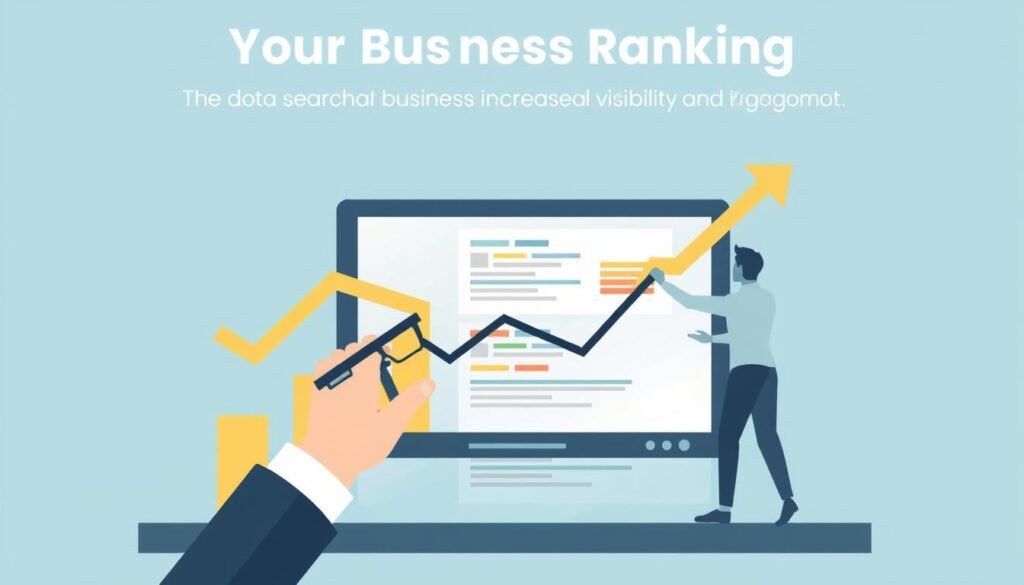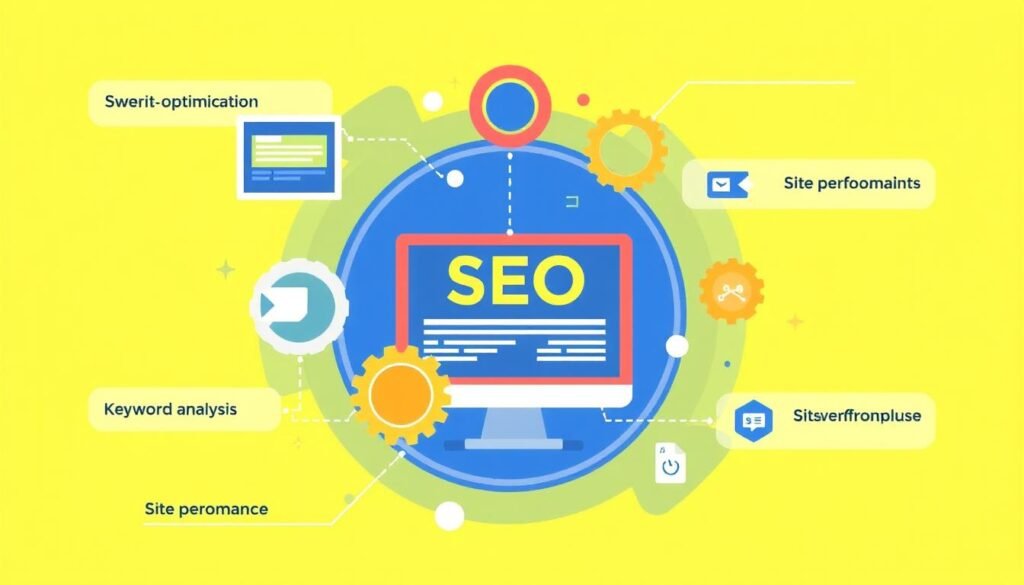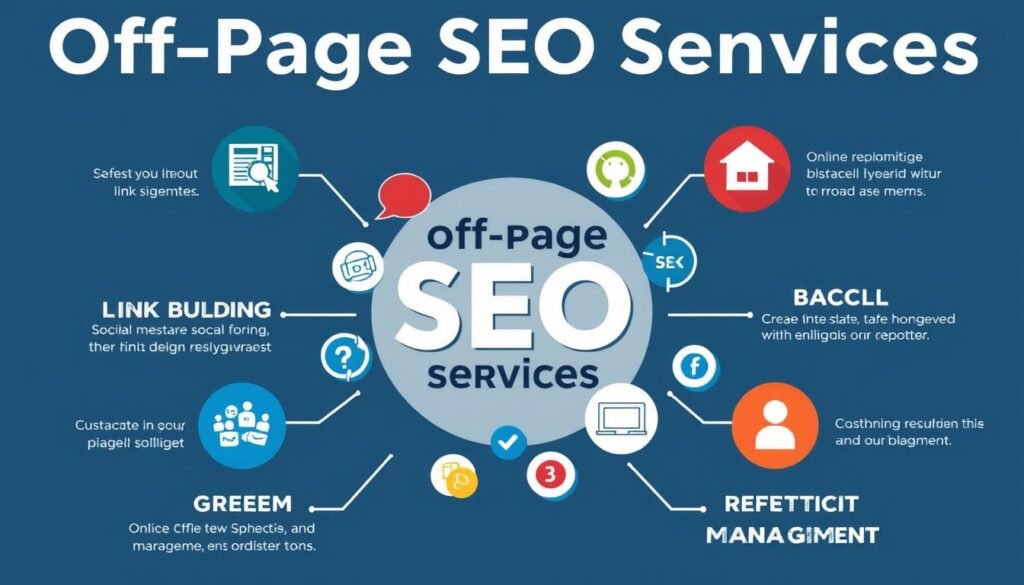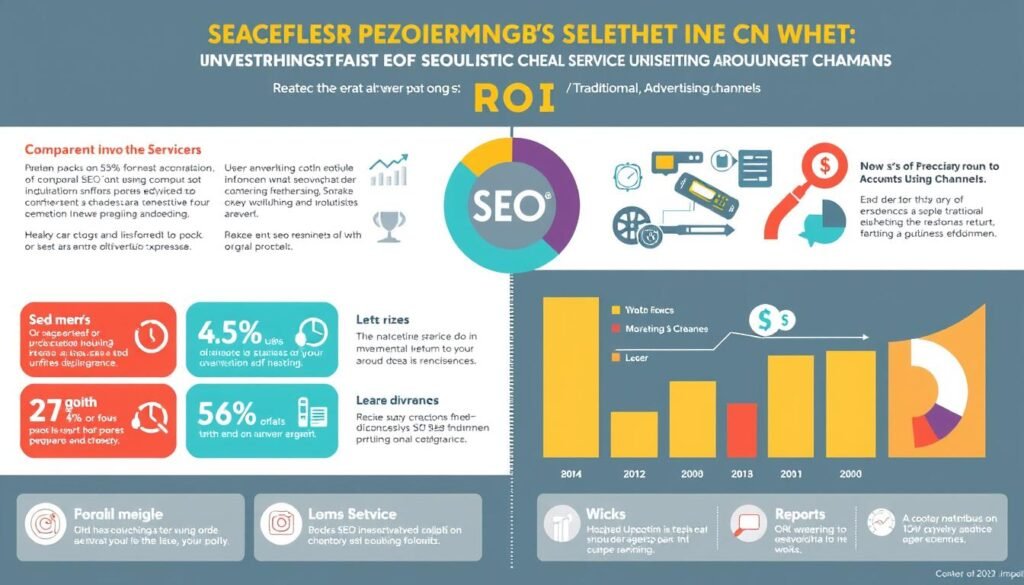In today’s digital landscape, a staggering 93% of online experiences begin with a search engine, making it crucial for businesses to understand the importance of search engine optimization.
As you navigate the complex world of online marketing, you’re likely to come across the term “SEO.” But what does it really mean for your business?
A well-crafted SEO strategy can significantly boost your website’s visibility, driving qualified traffic to your site and ultimately contributing to your business growth.
Key Takeaways
- Understanding SEO services is crucial for businesses looking to establish a strong online presence.
- A comprehensive SEO strategy can transform your digital marketing efforts.
- Search engine optimization works across different platforms.
- The three pillars of SEO are technical, on-page, and off-page optimization.
- A well-implemented SEO strategy can lead to long-term business success.
Understanding SEO Services: The Foundation of Online Visibility
To stay ahead in the competitive online market, it’s essential to grasp the fundamentals of SEO services. As technology continues to evolve, so do the ways in which we interact with search engines. A web search can now be voice-activated, and a click may simply be a tap on a mobile phone screen. Even the results we see from our preferred search engine may be summarized by artificial intelligence (AI).
What Are SEO Services?
SEO services encompass a broad range of strategies and techniques aimed at improving your website’s visibility on search engines. This is achieved through various optimization methods that make your site more search engine-friendly, thereby enhancing your rankings and driving more traffic to your site.
Key aspects of SEO services include:
- Understanding and implementing hundreds of ranking factors that search engines use to evaluate websites.
- Optimizing website content to be more relevant and of higher quality.
- Improving technical performance to ensure faster load times and better user experience.
- Building authoritative backlinks from reputable sources.
The Evolution of SEO in Digital Marketing
The landscape of SEO has undergone significant transformation since its inception. Initially, SEO involved simple tactics like keyword stuffing to rank higher in search engine results. However, this approach often resulted in low-quality content that wasn’t beneficial to users.
Today’s SEO is vastly different, with search engines employing advanced algorithms that prioritize user experience, content quality, and technical performance. Major algorithm updates, such as Google’s Panda, Penguin, and BERT, have refined how search engines evaluate and rank content.
The evolution of SEO now includes:
- Mobile optimization to cater to the majority of users who search on their mobile devices.
- Voice search considerations to accommodate the rise of voice-activated searches.
- Featured snippets and AI-generated search results that change how information is presented to users.
Understanding this evolution is crucial for businesses, as it highlights why SEO services must continuously adapt to changing search engine requirements and user behaviors to remain effective.
The True Meaning of SEO Services for Businesses

SEO services are more than just a buzzword; they represent a fundamental shift in how businesses approach online visibility. In today’s digital landscape, understanding the true meaning of SEO services for your business is vital.
Beyond Rankings: The Business Value of SEO
The value of SEO services extends far beyond achieving higher search engine rankings. It’s about creating a sustainable online presence that drives long-term results for your business.
Unlike paid advertising channels that deliver immediate but temporary results, SEO services focus on building lasting organic visibility that continues working for your business 24/7.
While social media marketing can help build brand awareness and engagement, SEO specifically targets users who are actively searching for information, products, or services—making it more effective at capturing high-intent traffic.
How SEO Services Differ from Other Digital Marketing Channels
SEO services differ significantly from other digital marketing channels in several key ways:
- Unlike paid advertising channels that deliver immediate but temporary results, SEO services focus on building lasting organic visibility that continues working for your business 24/7.
- While social media marketing can help build brand awareness and engagement, SEO specifically targets users who are actively searching for information, products, or services—making it more effective at capturing high-intent traffic.
- Email marketing reaches people who already know your brand, but SEO services help you connect with entirely new audiences who are searching for solutions you offer but may not be familiar with your business yet.
- Content marketing and SEO are closely related but distinct—content marketing focuses on creating valuable content, while SEO services ensure that content is discoverable by the right audience through search.
- Pay-per-click (PPC) advertising requires continuous investment to maintain visibility, whereas SEO services build equity in your website that appreciates over time, eventually reducing your customer acquisition costs.
- The data-driven nature of SEO services provides valuable insights into customer behavior and preferences that can inform your broader marketing strategy, creating synergies across all your digital marketing channels.
The Three Pillars of SEO Services
A comprehensive SEO strategy is founded on three key elements that together boost your website’s visibility and credibility. These pillars are crucial for any business aiming to establish a strong online presence and drive organic traffic to their site.
The three main facets of SEO services are Technical SEO, On-Page SEO, and Off-Page SEO. Each plays a unique role in how search engines perceive and rank your website.
Technical SEO: Building a Strong Foundation
Technical SEO is about creating a solid foundation for your website that makes it easy for search engines to crawl, index, and understand your content. This involves optimizing your site’s architecture, improving page speed, and ensuring mobile-friendliness.
A well-implemented technical SEO strategy can significantly enhance your site’s user experience and search engine rankings. It includes tasks like optimizing robots.txt, improving site speed, and implementing schema markup.
On-Page SEO: Content Optimization Strategies
On-Page SEO focuses on optimizing individual web pages to rank higher in search engines. This includes keyword research, content creation, and meta tag optimization.
Effective On-Page SEO involves crafting high-quality, engaging content that resonates with your target audience while also appealing to search engine algorithms. It’s about striking the right balance between readability and optimization.
Off-Page SEO: Building Authority and Trust
Off-Page SEO revolves around strengthening your website’s credibility and authority. It includes strategies like building high-quality backlinks, enhancing social signals, and other activities that occur away from your website but significantly impact its ranking.
- Off-page SEO services focus on activities conducted outside your website that influence how search engines perceive your site’s authority, relevance, and trustworthiness.
- The cornerstone of off-page SEO is building high-quality backlinks—when reputable websites link to your content, search engines interpret these as “votes of confidence” that boost your site’s credibility.
- Unlike technical and on-page SEO where you have direct control, off-page SEO requires strategic outreach, relationship building, and creating content compelling enough that others want to reference and share it.
By understanding and implementing these three pillars of SEO services, you can significantly improve your website’s visibility, drive more organic traffic, and ultimately boost your online success.
Technical SEO Services Explained

To ensure your website is search engine-friendly, leveraging technical SEO services is not just beneficial, it’s essential. Technical SEO is a multifaceted discipline that focuses on improving the technical aspects of your website to increase its visibility and ranking on search engines.
One of the critical areas technical SEO services focus on is website architecture and crawlability. A well-structured website architecture helps search engines understand your content and crawl your pages more efficiently. This involves organizing your website’s content in a logical manner and ensuring that all pages are accessible to search engine crawlers.
Website Architecture and Crawlability
A well-organized website architecture is fundamental to ensuring that search engines can crawl and index your content effectively. This involves creating a clear hierarchy of pages and using internal linking strategies to make it easier for users and search engines to navigate your site. For more information on technical SEO, you can visit our glossary of technical SEO terms.
Site Speed and Mobile Optimization
Another vital aspect of technical SEO services is optimizing your website’s site speed and ensuring it’s mobile-friendly. Search engines favor websites that load quickly and provide a seamless user experience across various devices. Improving site speed involves optimizing images, leveraging browser caching, and minifying CSS and JavaScript files.
Structured Data and Schema Implementation
Structured data, also known as schema markup, is code added to your website that helps search engines better understand your content and enhance your appearance in the search results. Some key benefits of structured data include:
- Providing search engines with explicit clues about the meaning of your content through standardized formatting.
- Enhancing how your content appears in search results through rich snippets, knowledge panels, and other enhanced listings.
- Strategically implementing various schema types relevant to your business, such as local business information or product details.
- Improving click-through rates by making your search listings more visually appealing and informative.
- Ensuring your structured data is properly formatted, validated, and consistently maintained across your website.
By implementing these technical SEO strategies, you can significantly improve your website’s visibility, drive more traffic, and ultimately boost your online presence.
On-Page SEO Services: Content and Optimization

As you navigate the complex world of digital marketing, understanding the intricacies of on-page SEO services becomes crucial for your online success. On-page SEO services are designed to optimize your website’s content and structure, making it more search engine friendly and improving your online visibility.
Keyword Research and Implementation
The foundation of effective on-page SEO services lies in thorough keyword research and implementation. This involves identifying the most relevant and high-traffic keywords related to your business and incorporating them naturally into your website’s content. By doing so, you can significantly improve your website’s visibility in search engine results, driving more targeted traffic to your site.
To implement keywords effectively, you need to understand the nuances of keyword density and placement. This includes using keywords in strategic locations such as headings, subheadings, and throughout the body of your content. However, it’s crucial to maintain a natural keyword density to avoid keyword stuffing, which can negatively impact your website’s ranking.
Content Creation and Optimization
High-quality, engaging content is the cornerstone of successful on-page SEO services. By creating content that resonates with your target audience and is optimized for search engines, you can improve your website’s relevance and authority. This involves not only using the right keywords but also ensuring that your content is well-structured, informative, and provides value to your readers.
When creating content, consider the importance of optimization techniques such as using header tags (H1, H2, H3, etc.) to structure your content and make it more readable. Additionally, optimizing images by using descriptive alt tags and file names that include target keywords can further enhance your content’s visibility in search results.
Meta Tags and Header Optimization
Meta tags and headers serve as critical signposts for both search engines and users, communicating what your content is about and how it’s organized. Title tags, for instance, are perhaps the most important meta element, requiring careful optimization to include target keywords while remaining compelling enough to encourage clicks.
- Meta tags and headers are essential elements of on-page SEO services, helping search engines understand your site’s content.
- Title tags should be optimized with target keywords and crafted to be compelling and click-worthy.
- Meta descriptions significantly impact click-through rates by providing searchers with a preview of what to expect from your page.
- Header tags create a hierarchical structure for your content, improving readability and helping search engines understand the relationship between different sections.
- Professional on-page SEO services ensure proper implementation of additional meta elements like canonical tags, meta robots tags, and Open Graph tags.
For more information on how to optimize your website’s security features, which is also crucial for SEO, you can refer to our guide on how to choose a web hosting provider with good security.
Off-Page SEO Services: Building Your Online Reputation

Off-page SEO services are a critical component of a comprehensive SEO strategy, focusing on building your brand’s authority and trust online. These services work in tandem with your on-page SEO efforts to improve your website’s visibility, credibility, and search engine rankings.
Effective off-page SEO involves several key strategies that collectively contribute to your site’s popularity and credibility. By leveraging these strategies, you can enhance your online reputation and drive more traffic to your website.
Link Building Strategies
Link building is a fundamental aspect of off-page SEO, involving the acquisition of high-quality backlinks from authoritative websites. These backlinks signal to search engines that your content is valuable and relevant, thereby improving your website’s authority and search engine rankings.
A well-planned link building strategy can include techniques such as guest blogging, resource pages, and broken link building. For more insights on how your web hosting can impact your website’s performance and SEO, visit The Role of Web Hosting in Website Performance.
Social Signals and Brand Mentions
Social signals and brand mentions are increasingly important for off-page SEO. While their direct impact on search engine rankings is still debated, they contribute to your brand’s online visibility and credibility. Social media platforms provide an opportunity to engage with your audience, share your content, and build your brand’s presence online.
By fostering a strong social media presence, you can drive traffic to your website, increase brand awareness, and potentially earn more backlinks from authoritative sources.
Online Reputation Management
Online reputation management (ORM) has become an essential component of off-page SEO services. It focuses on how your brand is perceived across search results and the broader web ecosystem. Professional ORM services monitor and influence what appears when users search for your brand name, ensuring that positive content ranks prominently while addressing negative content through strategic approaches.
Reputation management strategies include proactive content creation on authoritative domains, review management across industry-specific platforms, and strategic social media presence to control your brand narrative. For businesses recovering from reputation issues, professional SEO services develop recovery strategies that promote positive content while implementing technical approaches to address negative content where appropriate.
SEO Services Meaning in Different Business Contexts

The impact of SEO services varies significantly across different business contexts. As businesses operate in diverse environments, their SEO needs and strategies can differ substantially.
When considering SEO for small businesses vs. enterprises, several factors come into play. Small businesses often require more localized and targeted SEO strategies, focusing on specific geographic areas and customer bases. In contrast, larger enterprises may need more comprehensive and complex SEO approaches, addressing multiple markets, brands, and product lines.
SEO for Small Businesses vs. Enterprises
Small businesses typically have limited resources and must prioritize their SEO efforts. They may focus on optimizing their website for local search by including name, address, and phone number (NAP) consistently across the web, and creating content relevant to their local audience. For instance, a small bakery in New York might optimize its website for keywords like “best cupcakes in NYC” to attract local customers.
On the other hand, enterprises often have more extensive resources and can implement broader SEO strategies. They may invest in advanced technical SEO, such as site architecture optimization and large-scale content creation. For example, a multinational e-commerce company might develop a comprehensive content strategy that includes blog posts, product descriptions, and category pages optimized for various keywords and regions.
To maximize their online presence, businesses of all sizes can benefit from reliable web hosting services that ensure their websites are always accessible and loading quickly.
Industry-Specific SEO Considerations
Different industries face unique SEO challenges and opportunities, requiring specialized knowledge and tailored strategies. For example, e-commerce businesses need to focus on product schema, review management, and transactional keyword targeting, while service-based businesses may prioritize local SEO and reputation management.
- Highly regulated industries like healthcare and finance must navigate additional compliance requirements while creating engaging content.
- E-commerce SEO differs significantly from service-based business optimization, with a greater emphasis on product schema and review management.
- Local service businesses require geographically focused SEO strategies that emphasize Google Business Profile optimization and local citation building.
- B2B companies often need SEO services that target longer sales cycles with educational content addressing multiple stakeholders.
Understanding these nuances is crucial for developing effective SEO strategies that drive meaningful results. By recognizing the unique challenges and opportunities within their industry, businesses can better optimize their online presence and improve their search engine rankings.
Measuring the Success of SEO Services

Measuring the success of SEO services is a multifaceted process that involves tracking various performance indicators to understand the impact of your SEO efforts on your online presence.
To effectively measure SEO success, you need to focus on several key areas. Key Performance Indicators (KPIs) play a crucial role in this process. These KPIs help you understand whether your SEO strategies are yielding the desired results.
Key Performance Indicators (KPIs) for SEO
KPIs for SEO typically include metrics such as organic traffic, search engine rankings, click-through rates, and conversion rates. By monitoring these indicators, you can assess the effectiveness of your SEO efforts and make informed decisions about future strategies.
- Organic traffic growth
- Improvements in search engine rankings
- Enhanced click-through rates from search results
- Conversion rate optimization
Understanding SEO Analytics and Reporting
SEO analytics and reporting are critical components of measuring SEO success. By analyzing data from tools like Google Analytics and Search Console, you can gain insights into your website’s performance and identify areas for improvement.
Regular reporting helps you stay on top of your SEO efforts, ensuring that you’re always moving towards your goals. It’s essential to understand the data and translate it into actionable strategies.
Setting Realistic Expectations and Timeframes
Setting realistic expectations is crucial when it comes to SEO. It’s a long-term strategy that requires patience and consistent effort. Professional SEO services can provide you with transparent timelines based on your specific situation and goals.
Typically, you can expect to see initial results within 3-6 months, with significant improvements taking 6-12 months. Factors such as website age, competitive intensity, and the resources allocated to SEO can influence these timeframes.
By understanding these factors and setting progressive milestones, you can better manage your expectations and work towards achieving your SEO goals.
Case Studies: SEO Services Success Stories
Let’s explore how top brands have leveraged SEO to achieve remarkable success. By examining real-world examples, you can gain valuable insights into effective SEO strategies and how they can be applied to your business.
Two notable examples are Zapier and Wise, companies that have demonstrated exceptional SEO prowess. Their success stories highlight the potential of well-executed SEO services in driving business growth and online visibility.
Zapier’s Content Strategy: From 200 Searches to 1.6 Million Visits
Zapier’s journey is a testament to the power of a well-crafted content strategy. By focusing on creating high-quality, relevant content, they were able to increase their organic traffic from 200 searches to 1.6 million visits. This remarkable growth underscores the importance of content optimization in SEO.
Key takeaways from Zapier’s success include:
- Creating content that resonates with your target audience and addresses their needs.
- Optimizing content with relevant keywords to improve search engine rankings.
- Consistency in publishing high-quality content to maintain and grow your online presence.
Wise’s Backlink Strategy: Achieving a 75 Domain Rating
Wise exemplifies how a solid backlink strategy can elevate a brand’s presence in the search engine results pages (SERPs). Even without a dedicated SEO team until 2015, Wise achieved an impressive Domain Rating (DR) of 75. Their success hinges on two key strategies.
First, by offering a highly valuable and popular product, they naturally attracted high-quality backlinks without the need for active outreach. Customers and influencers in the industry organically linked back to Wise, vouching for its reliability and cost-effectiveness.
Second, Wise smartly leveraged PR campaigns that resonated with their brand values, gaining them not just media coverage but also valuable backlinks. This approach demonstrates that effective SEO services often integrate with broader business strategies rather than operating in isolation.
The key elements of Wise’s backlink strategy include:
- Offering a remarkable product that naturally attracts links from customers and industry influencers.
- Leveraging PR campaigns aligned with brand values to generate media coverage and valuable backlinks.
- Focusing on quality over quantity, earning links from highly relevant financial and technology websites.
These case studies illustrate that successful SEO services are not just about technical optimization but also about creating value and leveraging broader business strategies. By understanding and applying these principles, you can enhance your own SEO efforts and drive meaningful growth for your business.
Choosing the Right SEO Service Provider

As you embark on the journey of improving your online presence, choosing the right SEO service provider becomes a critical decision. With so many options available, it’s essential to make an informed choice that aligns with your business goals.
When selecting an SEO service provider, you have three primary options to consider: an agency, a freelancer, or an in-house team. Each has its pros and cons, which are discussed below.
Agency vs. Freelancer vs. In-House Team
An SEO agency offers a comprehensive range of services, backed by a team of experts with diverse skill sets. Agencies often have a proven track record and can handle large-scale projects. On the other hand, a freelancer can provide personalized service and may be more cost-effective for smaller businesses or specific projects. An in-house team gives you direct control over SEO strategies and implementation but requires significant investment in hiring and training.
To make the right choice, it’s crucial to assess your business needs, budget, and the level of expertise required. Consider factors such as the scope of your SEO project, the need for ongoing support, and the resources available to you.
Questions to Ask Before Hiring an SEO Service Provider
Before hiring an SEO service provider, asking the right questions can help ensure alignment with your business goals and protect you from potential pitfalls. Here are some key questions to consider:
- Request specific case studies relevant to your industry or business model—reputable providers should be able to share success stories that demonstrate their capabilities.
- Ask about their approach to strategy development: How will they assess your current position? What research methods do they use?
- Inquire about their processes for technical SEO, content optimization, and link building.
- Discuss reporting and communication expectations: What metrics will they track? How often will you receive reports?
- Don’t hesitate to ask about their ethics and compliance with search engine guidelines.
By asking these questions and carefully evaluating the responses, you can make an informed decision and choose an SEO service provider that meets your business needs and helps you achieve your online goals.
Some providers offer fixed-cost packages, which can help ensure a predictable cost month-to-month. This can be particularly beneficial for businesses that need to plan their expenses in advance. Additionally, these packages often eliminate the need for customers to pay for costly SEO tools, which can cost hundreds or thousands of dollars per month.
The Investment in SEO Services: Costs and ROI

Understanding the cost of SEO services and their return on investment (ROI) is crucial for businesses aiming to enhance their online visibility. SEO is a critical marketing channel, with organic search delivering 53% of all website traffic, according to a 2019 BrightEdge study.
SEO represents one of the most cost-effective marketing investments your business can make, offering exceptional ROI compared to traditional advertising channels that require continuous spending. To justify your investment and make data-driven decisions about resource allocation, calculating SEO ROI is essential.
Typical Pricing Models for SEO Services
SEO service providers use various pricing models, including monthly retainers, project-based pricing, and hourly consulting fees. The choice of pricing model depends on the scope of work, the complexity of the project, and the client’s specific needs.
Monthly retainers are common for ongoing SEO work, providing a consistent stream of services such as content creation, link building, and technical optimization. Project-based pricing is often used for specific SEO projects, like website audits or content strategy development.
Calculating the Return on Investment (ROI)
Calculating SEO ROI involves understanding both the costs and the full range of benefits SEO delivers. The basic ROI formula is (Revenue – Investment) ÷ Investment = ROI%. However, accurately attributing revenue to SEO efforts requires proper tracking and attribution modeling.
- Calculating SEO ROI helps justify your investment and make data-driven decisions about resource allocation.
- Beyond direct conversion value, comprehensive SEO ROI calculations should consider lifetime customer value, reduced paid search costs, brand visibility benefits, and the compounding nature of organic traffic growth.
- Professional SEO services help establish realistic timeframes for ROI expectations—typically 6-12 months for significant returns.
- Effective ROI tracking requires proper analytics setup, including goal tracking, e-commerce tracking, and multi-touch attribution models.
As SEO results compound over time, the ROI calculation becomes increasingly favorable compared to paid channels that require continuous spending to maintain visibility and traffic.
Conclusion: Embracing SEO Services as a Long-Term Business Strategy
As the digital marketplace continues to expand, the significance of SEO services in driving business visibility and revenue cannot be overstated. In today’s competitive online landscape, understanding and leveraging SEO is crucial for businesses aiming to establish a lasting digital presence.
SEO services represent not just a marketing tactic, but a fundamental business strategy that builds lasting digital assets and sustainable competitive advantages. By integrating SEO into broader business planning, businesses can align optimization efforts with product development, customer service, and other critical functions, thereby enhancing overall performance.
Unlike paid advertising, which ceases to be effective once the payment stops, SEO creates equity in your website that continues to deliver value over time. This makes it one of the most cost-effective long-term marketing investments. The most successful businesses view SEO not as a standalone service but as an ongoing process of improvement that evolves with changing search technologies, user behaviors, and competitive landscapes.
To achieve SEO success, consistency, patience, and a commitment to providing genuine value to your audience are key. Whether you choose to work with an agency, freelancer, or build an in-house team, the fundamental principle driving sustainable search visibility remains the same: delivering high-quality content and experiences that meet the needs of your target audience.
As search continues to be the primary way people discover information, products, and services online, businesses that invest in professional SEO services gain a significant advantage over competitors who neglect this critical channel. By embracing SEO as a long-term strategy, businesses can drive traffic, enhance brand awareness, and ultimately, boost revenue.
